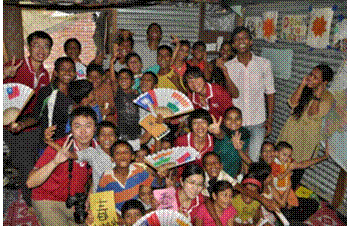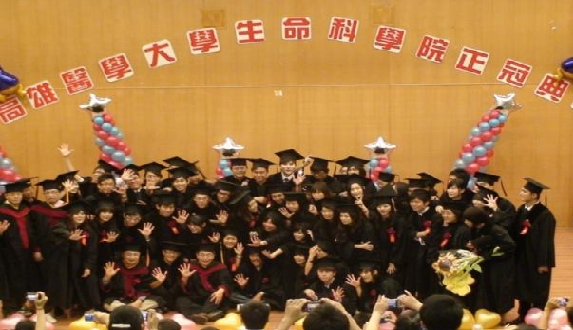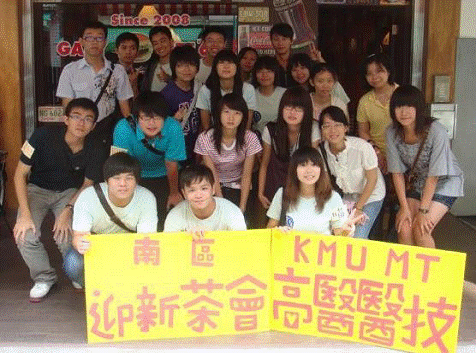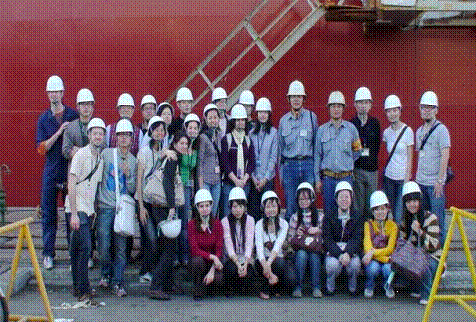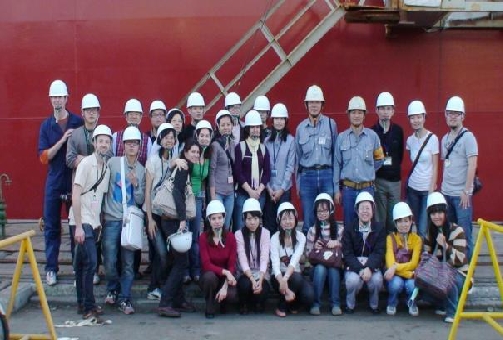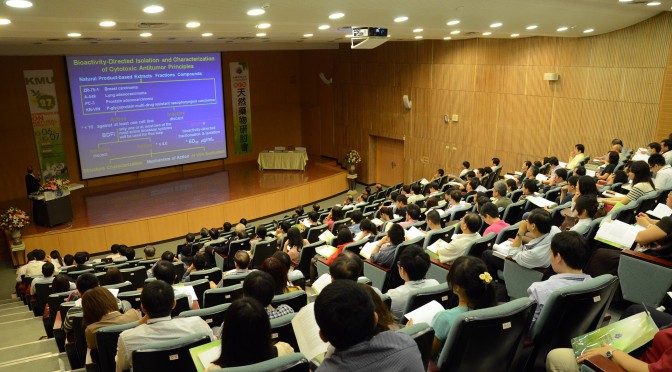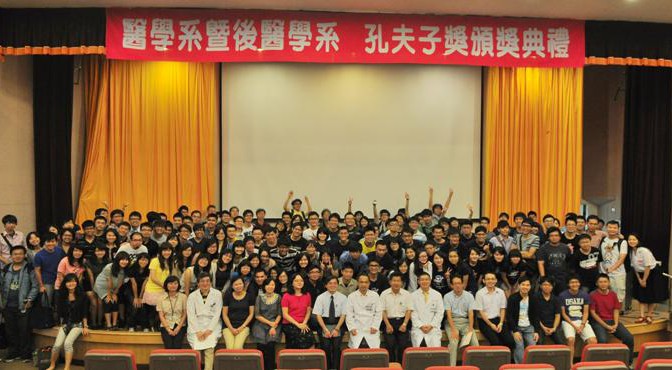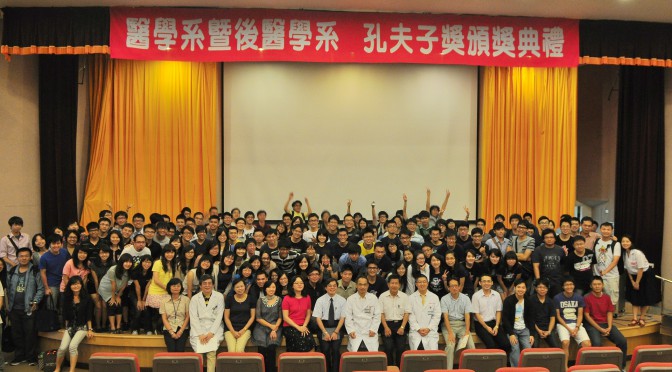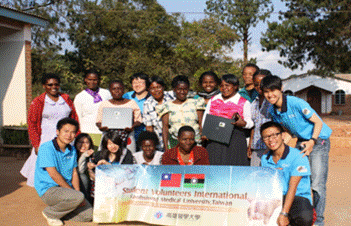The objectives of internationalization are to facilitate the international exchanges between Kaohsiung Medical University (“KMU”) and overseas universities/institutes in order to enhance the international competitiveness of both the teaching staff and students and thus nurture international professionals of the new era. These are consistent with the aims of our “Program for Promoting Excellence in Teaching and Learning” granted by the Ministry of Education, Taiwan. Though which we hope to increase the international exchange opportunities and promote global awareness of the faculties and students, develop teaching and learning resources for humane medicine, substantiate internationalization for teaching, establish an international campus and to promote internationalization via overseas learning.
Academic Exchange and Cooperation between Sister Universities
KMU values the significance of international exchange and cooperation in developing students’ global perspectives. We have signed a total of 52 cooperative and exchange agreements with 15 universities in 16 countries, including the USA, the UK, Canada, Australia, Poland, Hungary, Sweden, Israel, South Africa, Japan, Korea, Hong Kong, Malaysia, Republic of Indonesia, and India etc.
Mr. James Chen, the Chairman of the Board of Trustees of KMU, is committed to international academic exchanges. In 1995, he donated one million U.S. dollars to establish the “KMU-Harvard Alliance Fund” with a purpose to support young faculty, physicians, and medical students of KMU to have advanced training, research, or study at Harvard Medical School on a regular basis. Many faculty, physicians and students have benefited from this sponsorship and exposed to medical education of an international caliber in the teaching hospitals of Harvard Medical School. To enhance mutual exchange, KMU facilitated a program, Field Experience in International Occupational Health & Safety, for the graduate students of Harvard School of Public Health since 2004. For this program, 2.5 credits are recognized by Harvard School of Public Health. KMU has also successfully opened a four-week clinical elective course for Harvard medical students in April 2012 and 4 credits are recognized by Harvard. Moreover, some professors of Nephrology and Pathology at Harvard Medical School were invited to KMU for “Harvard Renal Week” teaching program since 2009. In addition to deliver lectures, they acted as PBL tutors with KMU faculty together. “Harvard Renal Week” has become a distinguishing feature of KMU medical program and is highly expected by KMU medical students. Due to the successful cooperation with Harvard University, Mr. James Chen was awarded a silver medal by the Ministry of Education, Taiwan for his contribution.
Student Study Abroad and International Volunteer Service
The frequency of academic exchange has been soaring. The College of Medicine has also been regularly selecting teaching/research staffs and students for academic exchange or practicing internships at the Harvard Medical School and the University of Hawaii. Master students at the School of Nursing attend the “Cross-cultural Nursing” course at the University of Texas Health Science Center at Houston, School of Nursing as part of their international exchange program. The College of Dental Medicine also has exchange programs with the School of Dental Medicine at the University of Pennsylvania for course learning or clinical exposure. Master students at the Department of Healthcare Administration and Medical Informatics at the College of Health Sciences have also been attending “Special Topics in US Hospital Management” courses at the Department of Health Administration, Virginia Commonwealth University.
To broaden students’ vision, supported by “the Program for Promoting Excellence in Teaching and Learning” that is sponsored by Taiwan Ministry of Education, we organized several student volunteer service teams to do public health related service in the Solomon Islands, the Republic of Malawi, Southern India and Northern India every year since 2007. Their dedicated performance wins recognition from the public and therefore has been awarded many prizes such as:
․ The Best, 2007 National GYSD(Global Youth Service Day) Competition on Group Performance of International Volunteer Service, the Team to the Republic of Malawi.
․ The 2nd Best, 2008 National GYSD Competition on Group Performance of International Volunteer Service, the team to Southern India.
․ The 2nd Best, 2009 National Youth Volunteer Service for Regional Peace Competition on Group Performance of International Volunteer Service, the team to the Republic of Malawi.
․ The Best, 2010 National Youth Contribution Award on Group Participation in International Service, the team to the Solomon Islands.
․ The Best, 2010 National Youth Volunteer Service for Regional Peace Competition on Creative International Service, the team to Northern India.
․ The Best, 2011 National Youth Contribution Award on Personal Participation in International Service, Yu-Lin Dai, School of Medicine.
․ The Best, 2012 iVT Competition on Innovative Group Volunteer Service, the team to Northern India.
Create a Friendly Environment for International Students
Since 2008, the Master’s Program in Clinical Medicine of KMU has joined the Higher Education Scholarship Program supported by the Taiwan International Cooperation and Development Fund (ICDF). There have been eight international students from the Republic of Gambia, Saint Lucia, Haiti, Guatemala, Mongolia and Swaziland enrolled in this program and six students successfully graduated. Furthermore, to help the Gambian Government educate medical laboratory professionals, KMU established a special 4-year bachelor program in Medical Laboratory Sciences and Biotechnology in 2010. The Gambian Government has sent 11 students to enroll in this program and sponsored all their tuition and expenses.
In addition, KMU has offered 20 different programs for international students in 2013 as follows:
| Degree |
Programs |
| Bachelor |
Post-Baccalaureate Medicine, Respiratory Therapy, Dentistry, Pharmacy, Healthcare Administration and Medical Informatics |
| Master |
Medicine, Medical Genetics, Dentistry, Fragrance and Cosmetic Science, Nursing, Natural Products, Sports Medicine, Pharmacy, Healthcare Administration and Medical Informatic, Biomedical Science and Environmental Biology, Medicinal and Applied Chemistry |
| Ph.D |
Medicine, Dentistry, Natural Products, Medicinal and Applied Chemistry |
Furthermore, a variety of scholarships are available for international students at KMU:
(1) Taiwan Scholarship: students may apply through local embassies/consulates of the Republic of China or Taiwan Economic and Cultural Office in the student’s home country.
(2) The Foreign Student Scholarships of the Ministry of Education, Taiwan.
(3) The Kaohsiung Medical University International Graduate Students Grant
(4) Various intra-mural scholarships of KMU
KMU has also been placing efforts on organizing and holding international academic conferences to share new knowledge. Success has been made in “International Symposium on Human Dengue Pathogenesis and Clinical Aspects”, “International Conference on Woman Scientists”, “International Conference on Food & Drug Safety Assessment”, “International Conference of Medical Professionalism & Humanities”, “International Conference on Liver Cancer: from Bench to Bedside”, “International Symposium for Disaster Medicine” and “International Conference on Evidence-Based Research and Practice in Older Adults,” etc. Through these conferences, the teaching and clinical staff at the University and affiliated Hospitals would have opportunities to develop liaison with international scholars.
To facilitate new era professional talents with international competencies for the global market, KMU is dedicated to establish an international campus. In addition to courses on foreign languages and professions, we plan to offer students education and training they may require for their future career. Our practices increase the number of English-lectured courses, dual/joint degrees, recognition of overseas courses, cultural activities, programs that train student ambassadors for international affairs, forums about Taiwan Elites and International Industries, etc. Furthermore, we offer grants for students who go abroad to experience various kinds of overseas learning, arrange internship programs in international companies, and provide information about international certificates related to medical professions. Through these strategies, we expect to broaden and deepen students’ vision and thus enhance their international competitiveness.
Facing the rapid development and the increasing competition in globalization, the higher education in Taiwan needs to catch the speed for internationalization, which is critical for pursuing excellence in education. We hope to develop a multi-dimensional, poly-cultural learning environment and provide cross-border resources and infrastructure to KMU faculty and students to broaden their vision and to facilitate development of communication capacities, in order to enroot the education for international humanistic medical service in Taiwan. Through this, it is hoped that the modernized professionalism and increased international competitiveness are to be developed and future leadership are to be incubated. These goals will only be achievable with the participation and efforts from all at the Kaohsiung Medical University.
